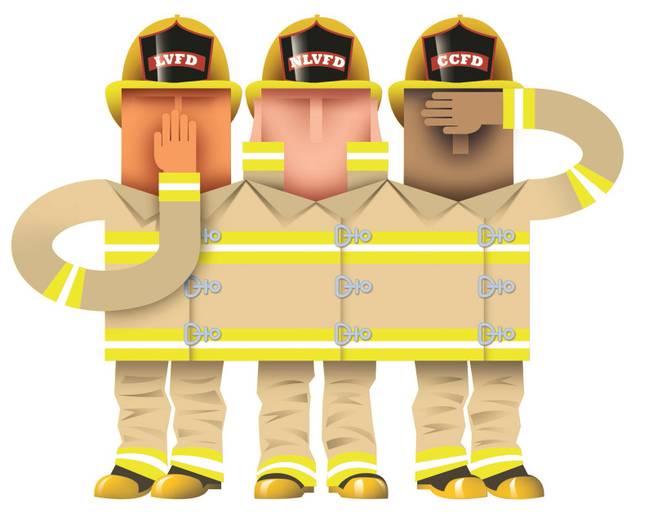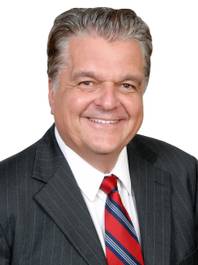
Chris Morris / Las Vegas Sun
Sunday, March 20, 2011 | 2 a.m.

Tick Segerblom

Steve Sisolak
Sun coverage
Sun archives
- Fire union official defends heavy use of sick leave in ’09 (3-6-2011)
- Firefighters' quest for a new perk was short-lived (3-4-2011)
- Under scrutiny, firefighter sick leave falls (2-27-2011)
- County considers seeking reimbursement over firefighter sick leave abuse (2-15-2011)
- County OKs contract with firefighters that saves $7.4 million (2-1-2010)
- Arbitrator backs county over firefighters’ union in contract negotiations (1-19-2011)
- County firefighters union preaches frugality, to others (11-2-2010)
- Sisolak offers proof of firefighters ‘gaming’ sick leave system (9-11-2010)
- County, firefighters’ union spar over contract negotiations (8-3-2010)
- Is a wave of county firefighter retirements on the horizon? (6-25-2010)
- Rory Reid says firefighters union resorting to ‘scare tactic’ with ad (6-15-2010)
- County considers plan to privatize airport firefighting force (6-11-2010)
- New plan to curtail Clark County firefighter overtime (6-5-2010)
- Staffing shuffle would cut county Fire Department overtime (5-20-2010)
- Las Vegas, Clark County collaborate to limit firefighter overtime (4-27-2010)
- Fire union resists move to increase its ranks, reduce overtime costs (4-16-2010)
- Has fire union support become a campaign curse? (4-15-2010)
Firefighters are pushing legislation to allow fire departments in Clark and Washoe counties to create regional agencies similar to Metro Police, which was formed from various Southern Nevada police agencies in the 1970s.
By consolidating departments, Assembly Bill 278 would shift public oversight of firefighting. Instead of city councils and county commissions approving employee contracts and appointing fire chiefs, the new agency would be headed by an elected fire chief, a post similar to Clark County sheriff. The new department’s finances would be governed by a board composed of county commissioners and city council members.
Although conservative business groups and legislators generally support consolidation of government agencies to improve efficiency, the bill has been greeted warily in Carson City.
It’s not the language as much as what is sponsoring it — the firefighters union.
Clark County firefighters are being investigated by the FBI and Metro for alleged abuses of sick leave to inflate overtime pay and their retirement accounts. And firefighters’ compensation has for many become symbolic of overly generous public employee pay amid historic budget deficits.
“If the firefighters union is pushing that, it would give me pause,” said Tray Abney, government relations director of the Reno-Sparks Chamber of Commerce.
The chamber supports consolidating governments if it saves money and provides better services, he said.
“I’m glad it’s being talked about,” he said. But “I’d seriously want to figure out why, or what’s in it for them.”
The legislation would not force any city or county into consolidation, just give them the option. The law would only apply to counties with more than 100,000 residents — Clark and Washoe.
Rusty McCallister, president of the Professional Firefighters of Nevada, said the bill would save money in the long term — any consolidation is two or three years away. He had no estimate of how much money would be saved.
“From the 20,000-foot view, it would allow them to eliminate services that are being duplicated” such as human resources, training and maintenance, McCallister said. And a larger department would have more leverage in negotiating equipment purchases, he said.
The 2009 Legislature approved an interim study to examine consolidation of local government services. On fire department consolidation, the study prepared by Las Vegas and Clark County was “pretty thin. It seemed cursory,” McCallister said.
Reno Mayor Bob Cashell recently proposed consolidating fire departments in Washoe County as a way to save money.
“With all that’s going on as far as budgets go, whatever we can do to look at consolidation of the services would be a good thing,” McCallister said.
AB278 has one significant difference from the legislation that created Metro in 1973. In that consolidation, the contract provisions most favorable to employees from each department were adopted by the new agency.
McCallister said the union removed the “cherry-picking” provision because of cost concerns. All employees’ salaries would be kept at current levels until a new contract were to be negotiated. (Sick time, vacation and longevity pay would also be rolled over for the new contract.)
Carole Vilardo, president of the conservative Nevada Taxpayers Association, put out a statement that the group supports the concept of consolidation. It did express concerns that:
• The fire chief would be elected, instead of accountable to commissioners and council members.
• Emergency medical services would be under the new agency. “The primary purpose of a fire department is firefighting,” Vilardo wrote. “The inclusion of ‘emergency medical services’ would appear to be a forerunner to eliminating the private ambulance services that are provided in Clark and Washoe counties.”
Clark County Commissioner Steve Sisolak, a critic of county firefighters, opposes the proposal.
He said that for decades no one seemed to care how much firefighters were paid or how much sick leave they took. Now that Clark County and the public are paying attention to firefighter pay and compensation, he thinks other jurisdictions will scrutinize their departments.
This bill is an attempt by the fire unions to avoid that scrutiny and maintain power, Sisolak said.
“The unions are starting to realize that public sentiment has swung so far against them and the abuses have become so prevalent that they’re afraid,” Sisolak said. “They want these changes because they think if they have an elected fire chief, they will have more control.”
McCallister noted that Metro has been praised by county commissioners, including Sisolak, on its contract negotiations. “He said Metro is the greatest thing since buttered bread. If it works for police, why not fire?” he said.
As for suspicions about firefighters being the ones pushing the bill, McCallister said: “I can’t find a second shooter on the knoll. The bottom line is they can think whatever they want. We don’t require them (cities and counties) to do this. This is enabling language.”
Assemblyman Richard “Tick” Segerblom, D-Las Vegas, a sponsor of the bill, said the Metro model was followed “because Metro is the most popular agency I know of.” But the bill needs tweaking and “we’re open to all suggestions,” he said.
When he first talked about the bill, “cities and counties whined because they didn’t want to lose their fire departments,” he said.
“Well, if the system isn’t broken, why do we read about it every day in the paper?” he said.
Metro is governed by a Fiscal Affairs Committee made up of two Las Vegas council members and two Clark County commissioners. They select a member of the public to serve as chairman.
The committee has jurisdiction over Metro money matters. But Sisolak, who sits on the committee, laments that it meets only monthly and the meetings are so short that “if it’s an hour long, that’s considered a long meeting.”
A frequent complaint from former Fiscal Affairs members is that there is little oversight by the two governments that provide most of the department’s funding.
“It’s pretty much left in the hands of the sheriff,” Sisolak said, adding he has faith in Sheriff Doug Gillespie, but politics and elected officials change.
The sheriff is elected, “so you’re putting all that funding into one person’s hands. It’s a system that sets itself up to be very, very political,” he said.
Sisolak sees other multijurisdictional boards in Southern Nevada operating in the same manner — averse to asking tough questions. But even when tough questions are asked, it’s almost impossible to get a majority to support making changes, he said.
“I’m on the board of the Southern Nevada Water Authority and they all just say ‘yes,’ ” he said. “Nothing gets done. No tough questions even get asked two-thirds of the time because that means they won’t have to worry about being transparent because transparency might endanger your re-election. It just makes it easier to go along with the status quo.”
The consolidation bill is a play by the firefighter unions “to dilute the power of the elected officials and increase the power of the fire department administration and the unions,” Sisolak said.
Many of the benefits of a consolidated fire department are being adopted in Clark County, Sisolak said.
Last summer, for example, the county fire department with assistance from county staff worked out shared services agreements with Las Vegas and Bullhead City, Ariz. The moves were projected to save the county millions of dollars in overtime payments and salaries.
Critics have said unions’ willingness to endorse or campaign for candidates has led to favorable contracts and the perception that officials are indebted to unions for their political careers.
Candidates have, however, been more cautious about accepting firefighters’ endorsements recently.
McCallister said they could campaign for a fire chief, “the same as we do for a state Senate or Assembly candidate, or county commission candidates.”
But, he said, “from what I read our endorsement isn’t worth anything anyway. Maybe a candidate to be fire chief wouldn’t want us to endorse him.”
Joe Schoenmann reported from Las Vegas.

Join the Discussion:
Check this out for a full explanation of our conversion to the LiveFyre commenting system and instructions on how to sign up for an account.
Full comments policy